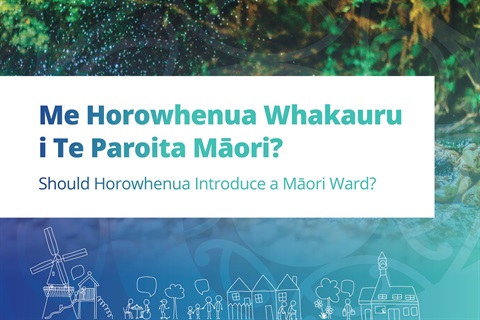
Me Horowhenua Whakauru i Te Paroita Māori?
The intention of Māori Wards is to provide a way for councils to achieve fairer representation of Māori members of their communities, and ensure greater Māori participation and input into council decision making processes.
Māori Wards and constituencies are the local government equivalent of the Māori parliamentary electorates. They are called ‘Wards’ at city and district councils and ‘constituencies’ at regional councils.
Under the Local Electoral Act 2001, councils decide their own representation arrangements, including whether to establish Māori and/or general Wards and constituencies.
Māori Ward Options
There is no obligation on councils to consider Māori Wards or constituencies as a result of the recent legislative change.
The following options were available to Horowhenua District Council.
Option A
Council chooses to retain the status quo and have no Māori Wards for the 2022 elections.
| Advantages |
Disadvantages |
- No staff or other Council resources are required
- This option enables Council plenty of time to engage with its Iwi partners ahead of the 2024-25 representation review, for the 2025 elections.
|
- Relying on Māori candidates standing in General Wards provides no guarantee that a Māori councillor will be elected.
- Lack of Māori representation increases the likelihood that Council decision making does not reflect the views and outcomes sought by Māori.
- Lost opportunity to further Māori participation in local government and decision making.
- Possible damage to the Council/Iwi relationship as Council is not demonstrating its commitment to partnership.
- Less adherence to the principles of partnership, participation, protection and practice under Te Tiriti o Waitangi.
- Has potential to bring about an adverse reaction in the community where there is support to establish a Māori Ward.
|
Option B
Council chooses to establish a Māori Ward for the 2022 and 2025 elections.
| Advantages |
Disadvantages |
- Recognises Council’s obligations under the LGA to increase participation of Māori in decision making and to recognise the diversity of its communities.
- Consistent with the principles under Te Tiriti o Waitangi.
- Ensures a Māori voice in the community is heard where fair representation may not otherwise be achieved.
- Recognises that non-Māori cannot fully represent the Māori position regarding issues at the table.
- Consistent with the Local Electoral Act 2001 to consider the principle of fair and effective representation for individuals and communities.
- Aligned with Council’s commitment to on-going development of the capacity of Māori to contribute to Council’s decision making processes.
- Strengthens relationship between Māori and Council.
|
- Has potential to bring about an adverse reaction in the community where there is opposition to establishing a Māori Ward.
|
Decision to establish a Māori Ward
The survey attracted 227 responses; the majority (178) indicated they were in support of establishing a Māori Ward. Members of the public were invited to speak at the May 19 Extraordinary meeting of Council and the response was universally in favour.
Councillors voted unanimously to support the establishment of a Māori Ward, which will take effect for the 2022 and 2025 elections.